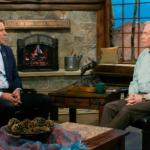
Over the last ten years my Christian faith has undergone a dramatic transformation. The beliefs that were once absolutely fundamental to my understanding of the universe and my own existence have been gradually deconstructed. It has been a confusing, unsettling and sometimes painful process, but I now feel I have in some way emerged from that confusion, and am feeling a sense of clarity, hope and excitement about my faith that I have never felt before.
In the early stages of deconstruction it felt as if the ground beneath my feet was crumbling. The “unshakeable” truths I had been taught to build my life upon were being dismantled one by one – it was exhilarating but terrifying.
I know far less now than I did ten years ago. I have far more questions than answers, and God seems more mysterious and unfathomable than ever.
I used to have everything sorted, organised into boxes and neatly stacked. Now the boxes are torn open and their contents strewn everywhere, but I am learning to live comfortably in the mess. Free from the constraints of my boxes, God seems bigger and more loving than ever, and the life and message of Jesus seems more real, relevant and fundamentally good.
The core message, or ‘Good News’ of Christianity that I learnt growing up went as follows:
God made people, people ‘sinned’ and went against God. God, being perfect and just, cannot stand sin and therefore must punish it with death and eternal torment. However, God loves us so much that he sent his only Son to die and take the punishment for our sin so that we can go to heaven and be with God after we die. All we need to do to be saved is become a Christian, which means admitting that we are sinners bound for hell, believing that Jesus died for us and accepting him as our personal Lord and Saviour. Anyone who fails to do this will go to hell and be punished forever.
This message, or something like it, has been central to Christian teaching (at least western evangelicalism) for a large chunk of history, and it has only started to be seriously challenged in the last few decades. It is a message based on the threat of eternal punishment, and I would argue that it has survived in this form for so long largely because it is based on and fuelled by fear. Questioning and doubting the core Christian beliefs has long been seen as a weakness, as “sinful”, so most people until fairly recently have followed along faithfully, interpreting any doubts as personal problems to be overcome or ignored.
As questioning religious beliefs has become more socially and culturally acceptable, many people have found their faith has been deconstructed to the point where they would no longer call themselves Christians, and have sought other ways to find meaning in life. Through all my own struggles with Christianity and church I have never been able to shake off the sense that there really must be more to life than what we see and experience – science alone cannot explain everything. The life and message of Jesus has continued to captivate me, and the more I have read and thought about it the more I have seen how much his message has been distorted, hijacked and misrepresented over the centuries, often with tragic consequences.
Well known Christian thinkers, speakers and writers who have moved into this new understanding of Christianity have come up against harsh criticism from other Christians. This is to be expected and I really can understand the desire to be conservative, to protect the strong framework of belief that has stood firm for so long. When your whole life and work has been built upon a particular belief system, it is a very unsettling, scary and unpleasant thing to see that system dismantled.
Biblical Interpretation
Those who have pioneered this rethinking process are often accused of not taking the Bible seriously. This thinking comes from people who read the Bible as if it were a scientific text book or an instruction manual for life – directly spoken from God to us, and therefore flawless and to be interpreted literally. With this mindset, taking the Bible seriously means taking individual passages, often entirely out of context, and applying them to our lives now. Theological discussions with people whose faith is based on this understanding of the Bible don’t get very far as the answer is always “because the Bible says so”. However, I am yet to meet anyone who takes the whole Bible seriously in this way – it is is just not possible to interpret everything literally. So whether they admit it or not, even the most conservative Christians have projected their own views and opinions onto the Bible, and are being selective about which parts to take seriously.
I have come to see the Bible as a family history – a rich and varied collection of texts spanning over a thousand years, telling the story of how God has interacted with people. It is written by many different people and includes eyewitness accounts, letters, poetry, songs and folklore, all inspired by people’s experiences of God. In understanding our family history we gain a sense of who we are and who God is, and in that sense the Bible is sacred, useful and relevant today. With this understanding, taking individual verses and passages out of context and applying them to our lives makes no sense whatsoever. We need to understand the cultural background, the intention of the writer and what it would have meant to people at the time. When this is done seriously, it can often change the meanings entirely.
By taking bits of the Bible out of context and interpreting them literally, Christians have justified a whole range of atrocities and injustices that most of us would now consider to be completely wrong. The Crusades, slavery and the oppression of women are just a few examples. The overarching story of the Bible is one of love, hope and reconciliation, but by taking bits out of context we have managed to construct belief systems based on fear, guilt and oppression.
Having grown up interpreting the Bible in this literal manner, I now see it as at best narrowminded and misguided, and at worst downright dangerous. In my mind, viewing the Bible in this way is not taking it seriously enough.
The result of the deconstruction of my belief framework is that I am more passionate than ever about my Christian faith. For a while I felt like I was ‘throwing the baby out with the bathwater’ – in weeding out the bad bits I was also losing all the good, reassuring, comforting and inspiring aspects of my faith that had once been so central to my life. For a number of years I was confused and angry, and church was a place of frustration and bitterness. I was mourning the loss of the security I had in my neat and tidy belief framework, whilst feeling frustrated that others weren’t thinking the same as me.
I now feel like I am “the other side of angry”, as a friend recently put it; I have regained the hope and security I once felt but the whole thing seems so much bigger and better, and makes so much more sense. The ‘Good News’ seems far, far better than it did before.
I feel that the Christian message as I was taught it massively and devastatingly missed the point, and I feel an increasing sense of urgency that the world desperately needs more of us to realise this.
Image via Pixabay
















